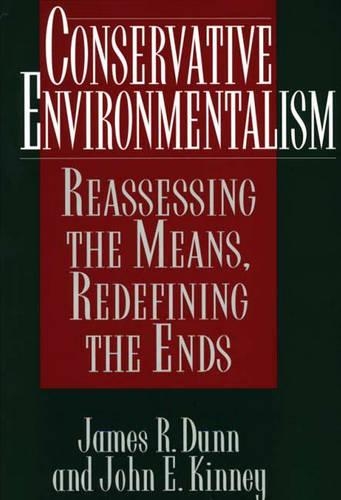
Conservative Environmentalism: Reassessing the Means, Redefining the Ends
(Hardback)
Publishing Details
Conservative Environmentalism: Reassessing the Means, Redefining the Ends
By (Author) James R. Dunn
By (author) John Kinney
Bloomsbury Publishing PLC
Praeger Publishers Inc
25th November 1996
United States
Classifications
Tertiary Education
Non Fiction
Environmentalist, conservationist and Green organizations
Property law: general
363.7
Physical Properties
Hardback
296
Width 156mm, Height 235mm
680g
Description
If America's environmental laws and regulations are left unchanged, they will ultimately contribute to the destruction of the human and natural environments. Dunn and Kinney argue that the environmental movement as it now operates is counterproductive; solutions can be found only through rational, non-political efforts based on reality, not ideological propaganda. The authors show what the facts are and how they have been distorted to benefit what are often misguided, self-serving political agendas. For anyone uncertain of the facts and baffled by conflicting viewpoints, Conservative Environmentalism will come as fresh air, bringing hope and encouragement that solutions are possible. The greatest environmental gains in human history have occurred in democratic First World nations over the past centurynations that have not only expanded their natural resources but also improved the human condition. The environmental Left has largely ignored these gains, stressing imperfections and promoting fear through unfounded, unproven theories or deceptions. specious evidence. To solve the problems they see, the Left uses regulations that severely impede technology and efficient productivitythe very things that improve environmental conditions. Rather than supporting the regulation of industrial productivity, Dunn and Kinney argue for its expansion. The authors compare downside and upside effects of environmental actions in both First World and Third World countries and examine the negative effects that U.S. EPA and U.S. AID edits and proscriptions have on development and the environment.
Reviews
The authors contrast the 'liability culture' of the environmentalists with the 'asset culture' of economists, including themselves, in current approaches to environmental problems. The book opens by laying out current environmental 'assets, ' then examines wealth and resources, and concludes with a section detailing their views on reaching a betetr environment...The information presented is clearly documented...and the main points of each section are neatly summarized. For academic collections.-Library Journal
"The authors contrast the 'liability culture' of the environmentalists with the 'asset culture' of economists, including themselves, in current approaches to environmental problems. The book opens by laying out current environmental 'assets, ' then examines wealth and resources, and concludes with a section detailing their views on reaching a betetr environment...The information presented is clearly documented...and the main points of each section are neatly summarized. For academic collections."-Library Journal
Author Bio
JAMES R. DUNN is a geologic consultant to Behre Dolbear, New York City. A professor of geology (including environmental geology) for 20 years at Rensselaer Polytechnic Institute, he founded the Dunn Corporation in 1960, a geological consultancy that evolved into an environmental firm with more than 350 employees. Dr. Dunn has more than 140 publications to his credit and has served as President of the American Institute of Professional Geologists. JOHN E. KINNEY is a Registered Professional Environmental Engineering Consultant, and a Diplomate, American Academy of Environmental Engineers./e A consultant to government, industry, and civic organizations for many years, he has testified at Congressional and state legislative and oversight hearings on water and natural resources and provided consulting service on various environmental problems in Europe, Africa, Australia, and the South Pacific. He is the author of more than 200 papers on environmental issues and many presentations to professional, industrial, and civic organizations.
